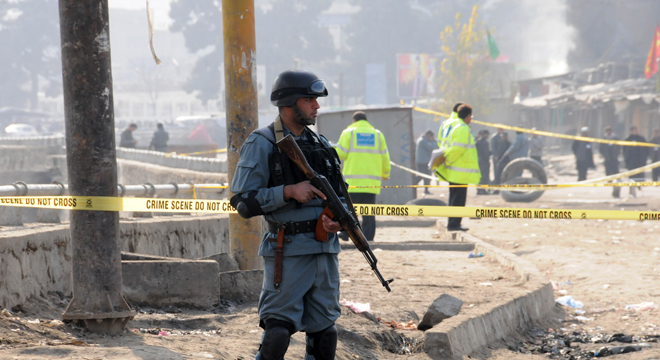From the Koran-burning that brought on violent protests to a rogue soldier killing 16 Afghan civilians, recent events provide the GOP candidates an opening to criticize President Obama’s handling of the war in Afghanistan — an opportunity they have taken full advantage of. But while the candidates agree to blame Obama, they have offered little in the way of solutions on how to bring the decade-long war to an acceptable end.
Arguably the candidate who comes closest to beating the war drum on Afghanistan is Rick Santorum. When asked about Afghanistan Sunday on ABC’s This Week, his first instinct was to simply attack Obama. “The bigger issue here is the policy of this administration,” Santorum said, claiming they have the enemy “hope” by creating a public timeline for withdrawal. His take, as he put it, is “let’s either commit to winning, or let’s get out.” But when pressed, Santorum went on to say that he could see staying in the region a long time.
Well, I think if you commit to winning and you change the entire dynamic in the region, you change the dynamic with respect to the Taliban, and you recognize that we’re going to stay there and we’re going to finish the job.
In contrast to Santorum, Newt Gingrich staked out a position last weekend in favor of pulling out of Afghanistan, telling Chris Wallace on Fox News Sunday, “I think that we are risking the lives of young men and women in a mission that may frankly not be doable.”
Of the three, Romney remains the most vague. On Fox News Sunday, Romney jumped at the opportunity to criticize Obama’s handling of Afghanistan as “failed leadership,” offering that he would be in “day-to-day” contact with President Karzai if he were president. But “before I take a stand at a particular course of action, I want to get the input from the people who are there,” Romney said, repeating his longstanding position that his position will be based on what generals on the ground tell him.
Romney may not be able to demur for much longer. As the former governor mentioned himself, Gen. John R. Allen, the commander of allied forces in Afghanistan is scheduled to report on the state of the mission and withdrawal in a Congressional hearing next week.
The issue is difficult for Romney, whose top surrogate, John McCain, is one of the strongest voices in opposition to the drawdown in Afghanistan. In addition, by tying himself to the generals on the ground, Romney could find himself allied with the those who oppose an accelerated withdrawal — and unwittingly on the side of Obama.
As the New York Times has reported, “Mr. Obama’s military commanders, meanwhile, want to maintain troops in Afghanistan as long as possible.” At the same time, polls show Americans do not want the war drawn out much longer. A USA Today/Gallup Poll this week showed half of Americans want an accelerated drawdown in Afghanistan, while just 21 percent said U.S. forces should remain there as long as it takes to accomplish its goals.
The candidates are getting little direction from leaders in the Republican Party who are also split on Afghanistan.
“On this issue, I’m not sure there is necessarily a clear consensus, and I think people are in different places,” Sen. John Thune (SD), the third-ranking Senate Republican, said recently. “It’s a process a lot of our guys are going through in terms of trying to figure out what’s the right way forward.”









